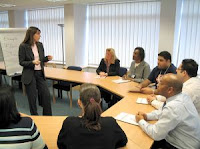 When having a running program it is important to have contact with all the participants. And especially in the start of a program. A short phone call or maybe an email to both the mentee and the mentor, just to get information about the first mentee/mentor meeting and the match. It is important for the participants because they feel taken care of and we can lure out if it´s something wrong.
When having a running program it is important to have contact with all the participants. And especially in the start of a program. A short phone call or maybe an email to both the mentee and the mentor, just to get information about the first mentee/mentor meeting and the match. It is important for the participants because they feel taken care of and we can lure out if it´s something wrong.
Not wrong maybe but if it´s a good or bad match or maybe if the mentee isn´t prepared or maybe the mentor is talking to much. Maybe the mentors isn´t that clear as a mentor and the meeting is almost as an information meeting.
I have no been sitting for two days and having those calls. And I am loving it!!!
They have all sort of feedback, but they all are saying something like: I love my mentor, the mentor is great, It is great meetings and very useful discussions. And the mentor is telling me about their great mentee and how they are running the meetings and using case.
In these two days I have only experienced one mentee who was not that satisfied with the mentor. But through the conversation we concluded two important things for the mentee for the next meeting. Number one: Be prepared and number two: have some concrete to talk about before the meeting. It could be the leader role, budgeting, new as a leader or other things. And when we said goodbye the mentee the mentee thanked me for the feedback and the little mentoring I have done.
As a coordinator for mentoring programs this is important, you can´t have your mentees and mentors living their own lives between the start and the ending of a program.


